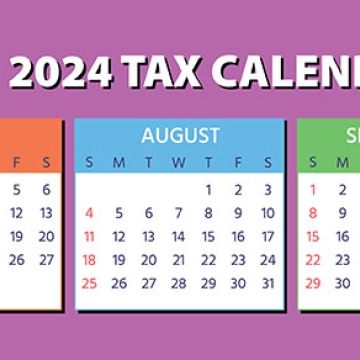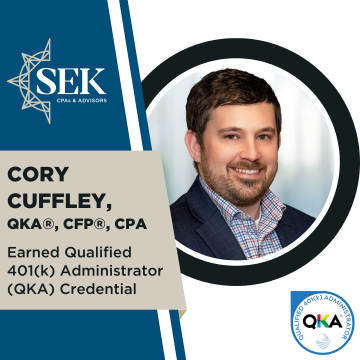SEK Receives United Way of Washington County, MD’s FIRE Award
SEK, CPAs & Advisors received the United Way of Washington County, Maryland’s annual FIRE Award, presented for Distinguished Achievements in the Finance, Insurance and Real Estate (FIRE) sectors.
What might be ahead as many tax provisions are scheduled to expire?
We’re likely to see major federal tax changes within the next year or two. The reason has to do with the upcoming elections and provisions of the Tax Cuts and Jobs Act (TCJA) that are set to expire on Dec. 31, 2025. What will happen to YOUR taxes depends on which scenario becomes reality. Contact the CPAs and tax advisors at SEK for more information.
SEK Announces Mid-Year Promotions
The Members of SEK, CPAs & Advisors are pleased to announce the following Manager, Supervisor, and Senior Associate promotions effective July 1, 2024:
Undue influence claims may upend your estate plan
If someone is found to have exerted “undue influence” over your final estate decisions, a family member may challenge your will after your death. Establishing that you are “of sound mind and body” when you sign your will can go a long way toward combating an undue influence claim. Contact the CPAs and estate advisors at SEK for additional steps you can take to avoid future undue influence claims.
Nonprofit: Cross-training initiatives can get your whole organization in shape
Elite athletes cross-train to promote full-body strength, enhance performance and reduce the risk of injury. Nonprofits that cross-train staffers on one another’s jobs can reap similar results. If your employees understand the basic functions of other positions, they can jump in and help out if someone goes on disability leave or there’s a work surge in a particular department. For more information, contact the CPAs and business advisors at SEK.
2024 Q3 tax calendar: Key deadlines for businesses and other employers
Here are a few key tax-related deadlines for businesses and other employers during the third quarter of 2024.
Social Security tax update: How high can it go?
Employees, self-employed individuals and employers all pay Social Security tax, and the amounts can get bigger every year. And yet, many people don’t fully understand the Social Security tax they pay. Contact the CPAs and tax advisors at SEK with your tax questions.
Hiring your child to work at your business this summer
Are you hiring your child to work at your business this summer? Certain noncorporate entities can hire an owner’s under-age-18 children and their wages will be exempt from the following federal payroll taxes: Social Security tax, Medicare tax and federal unemployment (FUTA) tax. Contact the CPAs and business tax advisors at SEK to learn how to take advantage of these tax tips.
Cory Cuffley, QKA®, CFP®, CPA Earns Qualified 401(k) Administrator Credential
SEK, CPAs & Advisors is pleased to announce Cory Cuffley, QKA®, CFP®, CPA, Manager, has successfully completed the certification process with the American Society of Pension Professionals and Actuaries (ASPPA) to earn the Qualified 401(k) Administrator (QKA®) credential.
Don’t overlook digital assets in your estate plan
When it comes to digital assets, it’s important to know that, unlike other asset types, they leave little to no “paper trail.” Thus, unless your estate plan specifically provides for them, it may be difficult for your family to access these assets (or even know that they exist). Contact SEK for more information.









